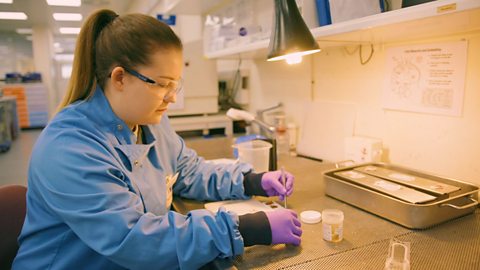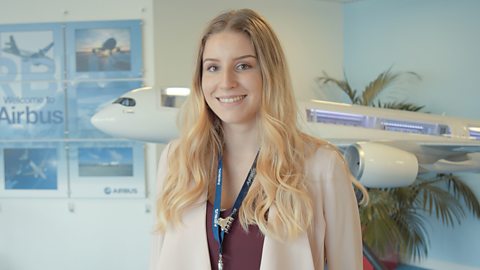In a degree apprenticeship, you combine working for a company and studying towards a university degree. As an apprentice, you are employed and earn a wage throughout the whole programme, but will spend part of your time (around 20%) studying at degree level. It’s a great way to earn on-the-job experience, get a degree and not clock-up student debt.
Your employer, university, and any relevant professional bodies work in partnership to design the course. You could be in different locations from one day to the next, or complete blocks of time studying and blocks of time working, depending on your programme. You might study on a university campus in lectures and seminars, or remotely via an online platform. There will be lots of self-directed study to work through, as well as exams.
Degree apprenticeships can take between three to six years to complete, but at the end you will be fully qualified to work in your chosen career.
There’s a lot to juggle in a degree apprenticeship, and it requires a high level of dedication and maturity. However, if you’re keen to get your foot in the door but want to do a job that requires a degree, this could be the perfect path for you.
To help you make up your mind, we spoke to some degree apprentices and asked them to share what it’s like with us.


Georgia Creswell
One size doesn't fit all, but for me it's been a massively positive experience.
- Pathology apprentice at MedImmune
- 5 year course
- BA Science with Honours in Applied Bioscience
Georgia is doing a Level 6 degree apprenticeship at MedImmune where she helps to develop medicines. She chose to do a degree apprenticeship after completing work experience in a lab during her A-levels: “I thought, ‘I like this hands-on experience’ and I knew that at uni you don’t get as much time in the lab – with an apprenticeship it’s your job to be in the lab and do it day-to-day, from day one.”
Another deciding factor for her were the long-term prospects: “Knowing what the job market was like, I asked myself what would put me ahead. All the employers were asking for experience, so it made sense to do the apprenticeship – it gave me an advantage over traditional graduates.”
Georgia spends one day a week studying and the other four working on projects – although this can be flexible. Her course is completed remotely via online textbooks and lectures, so she can do her uni work in the office or at home.
Georgia says that her favourite thing about doing an apprenticeship is “the amount of responsibility that you’re given”. She had ownership over her work from the first few weeks and was trusted to “deliver the work and deliver it well” from the start.
“One size doesn’t fit all,” says Georgia, “but for me it’s been a massively positive experience. If you like a challenge, and want to do something different and exciting, an apprenticeship is a great option.”



Ciaran Kane
You are thrown in the deep end but you learn how to swim much quicker.
- Electrical engineering apprentice with Schneider Electric
- 5 year course
- BA in Integrated Engineering (Hons)
Ciaran’s apprenticeship is structured in blocks. He completes 10 weeks in full-time work, during which time he completes online lectures and distance learning, followed by one week on the university campus. The “campus week”, he says, is “full of lectures, course work and homework”. This is a tough juggling act, but Ciaran believes that if ”you put the work in now, you’ll come out with more than you need to succeed.”
After choosing to repeat his AS-levels in order to improve his grades, Ciaran realised that he was a “hands-on” learner and that a strictly academic route wasn’t for him. Whilst he felt pressure from his mum to go to university and agrees that “having a degree is a good tool – it opens doors”, his dad was more open to other paths and encouraged Ciaran to look at apprenticeships. A degree apprenticeship has given him “the best of both worlds”… and helped him to keep both parents happy!
Ciaran is 20 years old and has had to learn about the “big bad world of work” very quickly: “You are thrown in the deep end,” he says, “but you learn how to swim much quicker.” When he completes his apprenticeship, Ciaran will have 5 years’ experience in a big corporation, working with thousands of experts, plus he’ll have a degree behind him – “that’s what will set me apart in the job market,” he says.
“You need to think outside the box and think for yourself, instead of listening to what everybody else is telling you,” Ciaran says. “Make your own decisions. There are plenty of different paths and different doors – you just have to open them for yourself.”



Jasmine Ewers
It has given me the confidence and opportunity to excel.
- Engineering apprentice at WSP
- 5 year course
- BEng Civil Engineering
Jasmine chose to do an apprenticeship when she realised that uni was the wrong choice for her as she preferred to learn in a more practical way: “I was used to learning on the job, doing more hands-on tasks.”
For Jasmine, an apprenticeship was empowering as she could gain “a qualification alongside unbeatable industry experience”. It gave her, she says, “a huge advantage” over traditional graduates. It’s exciting too! Jasmine works on projects that will shape the future, such as the high-profile HS2 project: “Having the ability to work on real-life projects has given me the confidence and opportunity to excel,” she says.
Jasmine is in the office four days and spends one day a week in university. Unlike Georgia, she studies on campus, so spends a day a week in the university grounds, surrounded by other students.
Don’t be fooled into thinking that juggling work and study is easy though. “It may take some time to get the hang of things,” says Jasmine, “however it has immensely helped to improve my time-management and organisational skills and has really driven me to succeed.”


There are lots of different apprenticeships to explore. You can search for opportunities on the government website or UCAS.
Zuzanna: apprentice wing designer. video
Zuzanna's an apprentice wing designer, gaining a degree as part of her apprenticeship.

UCAS: Apprenticeships in the UK. External Link
Find out about apprenticeship opportunities near you.

Omar: chartered management degree apprentice. video
Omar is a degree apprentice at EY. He works in the anti-money laundering team.
